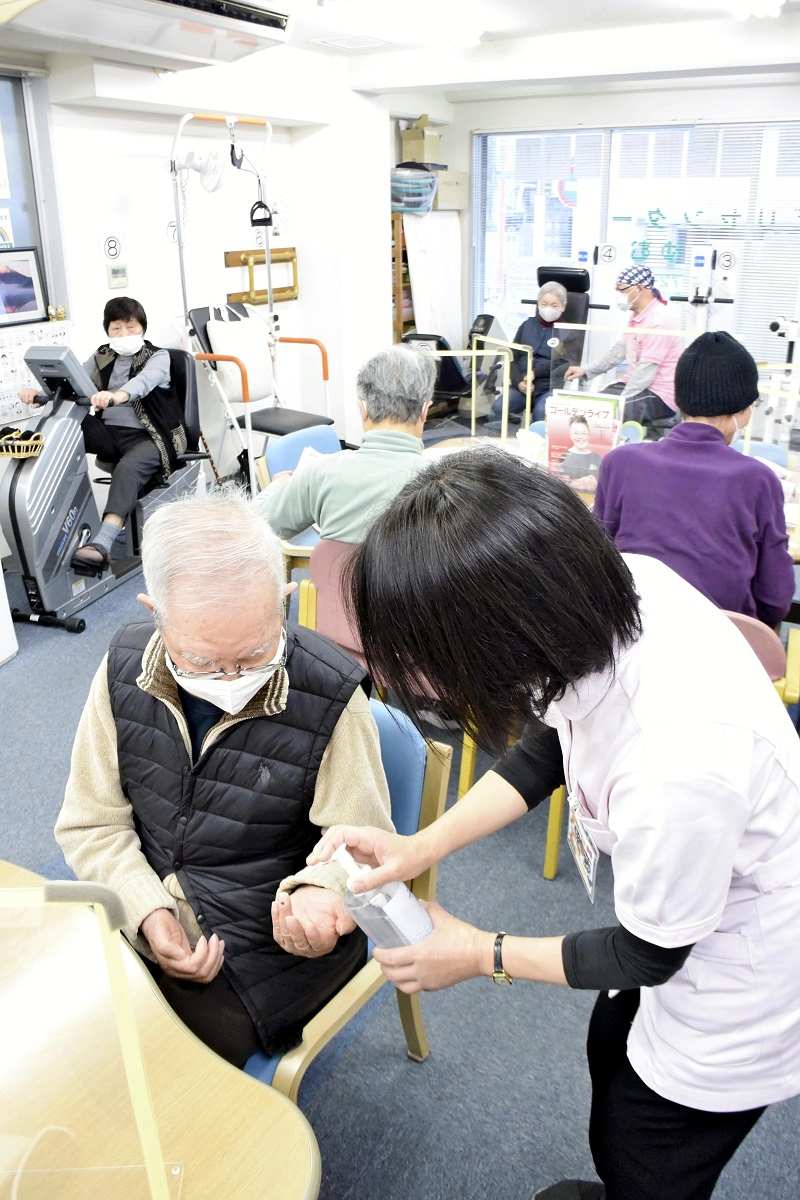
An elderly man disinfects his hands at the rehabilitation center Ayumu in Toshima Ward, Tokyo, on Jan. 19.
19:20 JST, February 18, 2021
Nursing care staff are stressed and exhausted every day as they work in direct contact with elderly people, who are more likely to develop severe symptoms if they catch the coronavirus. Some elderly people are also refraining from using nursing care services, which has dealt a heavy financial blow to service providers. Some may become unable to continue their operations.
Staff fear infection
“While the general public is required to exercise self-restraint, we cannot stop providing nursing care services for elderly people. We must prevent any infection within the facilities and we are increasingly nervous about that,” said Junichi Hiraguri, the 38-year-old vice president of Care Station Ozora, based in Sakai, Osaka Prefecture. It operates eight nursing care facilities in Osaka Prefecture, including private residential nursing homes, while also dealing with the second state of emergency.
Nursing care for elderly people is a job that requires great care. Workers have had to pay extra attention to their tasks for nearly a year because elderly people easily develop severe symptoms if they contract the disease. They are exhausted from a prolonged battle against the virus that shows no sign of ending.
Some elderly people do not want to disinfect their hands because they get rough and dry. Much of the work involves physical contact, such as changing diapers for people who also have a fever. “The staff are extremely anxious about getting infected,” Hiraguri said.
Financial damage
“Let’s wash and disinfect our hands carefully after going to the bathroom,” Michie Ito, a 65-year-old nurse working for the rehabilitation center Ayumu in Toshima Ward, Tokyo, said to a 77-year-old male user in late January. He carefully rubbed his hands with hand sanitizer gel.
The center’s capacity is 18 users, but only nine people came that day. “We explain that we take thorough infection prevention measures, but many elderly people avoid using our service,” Ito said. The center has a serious financial deficit. “We barely manage to run the business with profits from the home-visit nursing service,” said Kazufumi Kishikawa, 54, of Care Friend Toshima, which operates the rehabilitation center. Even if the state of emergency is lifted, it is unlikely that the number of users will increase quickly. “I’m not sure which will happen first: seeing elderly users return or seeing our company collapse,” Kishikawa said.
Home visits
Since the beginning of this year, a home-visit nursing service provider in Tokyo has been caring for an increasing number of elderly people who have to stay at home even after testing positive for the coronavirus and developing a fever, because no hospitals can accept them.
The provider continues to have staff visit the homes of people in serious need of nursing care, such as assistance going to the bathroom. It limits the number of home helpers who visit people who have tested positive and the office has strict zoning in place so that these workers will not have contact with other staff members. To prevent their own families and other users from getting infected, these helpers stay at hotels while they continue to work, according to the provider.
“We can only keep providing the service by solely relying on the sense of responsibility of individual home helpers and we are all exhausted and nervous,” the manager of the operating company said.
At Welcia Kaigo Service Tsukuba, which provides home-visit nursing care and other services in Tsukuba, Ibaraki Prefecture, five of the seven staff members who run the bathing service were forced to stay home at the same time in December last year because their families or users of the service were suspected of having been infected. As a result, the facility had to suspend the provision of services for two days. It is staffed with 20 workers, and facility manager Manabu Iwasaki, 43, said: “We were already short of staff. The coronavirus pandemic has worsened the situation and it is increasingly uncertain whether we can stay in business.”
At the office of a home-visit nursing service operated by social welfare corporation Chiba Kinrosha Fukushikai, seven out of its 60 home helpers resigned last summer. All of them were experienced home helpers who had worked for more than 10 years, but they quit for such reasons as being concerned about passing the infection on to users or because their families were anxious about the risk of them being infected.
Top Articles in Society
-

Man Infected with Measles Reportedly Dined at Restaurant in Tokyo Station
-

Man Infected with Measles May Have Come in Contact with Many People in Tokyo, Went to Store, Restaurant Around When Symptoms Emerged
-

Woman with Measles Visited Hospital in Tokyo Multiple Times Before Being Diagnosed with Disease
-

Australian Woman Dies After Mishap on Ski Lift in Nagano Prefecture
-

Foreign Snowboarder in Serious Condition After Hanging in Midair from Chairlift in Nagano Prefecture
JN ACCESS RANKING
-

Japan PM Takaichi’s Cabinet Resigns en Masse
-

Japan Institute to Use Domestic Commercial Optical Lattice Clock to Set Japan Standard Time
-

Israeli Ambassador to Japan Speaks about Japan’s Role in the Reconstruction of Gaza
-

Man Infected with Measles Reportedly Dined at Restaurant in Tokyo Station
-

Videos Plagiarized, Reposted with False Subtitles Claiming ‘Ryukyu Belongs to China’; Anti-China False Information Also Posted in Japan
























